Timeline of Sussex history
This is a timeline of Sussex history. To read about the background to these events, see History of Sussex. See also the list of monarchs of Sussex.
1st century
| Year | Date | Event | Reference |
|---|---|---|---|
| c. 15 | Verica succeeds Eppillus as king of the southern Atrebates (approximately modern Sussex and south-east Hampshire) with a capital at or close to what went on to become the Roman Noviomagus Reginorum (modern Chichester) | [1] | |
| by 42 | Caratacus, king of the Catuvellauni tribe, conquers the southern Atrebatic kingdom and expels Verica. | [2] | |
| c.43 | Romans land on Sussex coast as part of the Roman conquest of Britain, perhaps in support of Verica. Under Roman rule the client kingdom of the Regnenses or Regni is created from the southern Atrebatic kingdom for Cogidubnus that includes much of what is to become Sussex. | [3][4] | |
| c.80 | Kingdom of Regnenses or Regni, becomes a Roman canton or civitas with its capital at Noviomagus Reginorum (modern Chichester). | [3] |
2nd century
| Year | Date | Event | Reference |
|---|---|---|---|
| c.150 | Ptolemy's Geography mentions several places in what was to become Sussex including Magnus Portus, Noeomagus (Noviomagus Reginorum), Novus Portus and the Flavius Trisantona (River Arun). | [5] |
3rd century
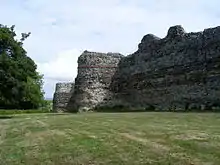
Roman masonry in the walls of Anderitum
| Year | Date | Event | Reference |
|---|---|---|---|
| c.200-250 | Beachy Head Lady buried at East Dean, the first known person of sub-Saharan origin in Britain. | [6] | |
| c.293-300 | The Romans build the Saxon Shore fort of Anderitum at Pevensey | [7] |
5th century
| Year | Date | Event | Reference |
|---|---|---|---|
| c.410 | Romans leave Britain | [8] | |
| 460s onwards | Hoard of coins deposited at what is now Patching. | [9] | |
| c.477 | Aelle arrived at Cymenshore; Aelle goes on to become the first king of Sussex and the first Bretwalda. | [10][11] | |
| 485 | Battle of Mercredesburne | [12] | |
| 491 | Siege of Anderitum in modern Pevensey. | [13][14] |
6th century
| Year | Date | Event | Reference |
|---|---|---|---|
| c.500 | The beginning of the Heptarchy, which includes the Kingdom of Sussex. |
7th century
| Year | Date | Event | Reference |
|---|---|---|---|
| 607 | Ceolwulf of Wessex fights the South Saxons | [15] | |
| 661 | King Æthelwealh of Sussex becomes Christian and his territory expands westwards to include the Meon Valley and the Isle of Wight. | [16] | |
| c. 679 | Sussex is affected by famine. | [17] | |
| 681 | St Wilfrid arrives in Sussex. | [18] | |
| c.681 | Selsey Abbey founded. | [18] | |
| 685-686 | Cædwalla of Wessex invades Sussex, killing King Æthelwealh of Sussex. | [19] | |
| 686 | South Saxons attack Hlothere, king of Kent, in support of Hlothere's nephew Eadric. | [20] | |
| c.7th century | Sussex appears in the Tribal Hidage. | [21] |
8th century
| Year | Date | Event | Reference |
|---|---|---|---|
| c.700 | Parts of Sussex are mentioned in the Ravenna Cosmography including Nouiomago or Nauimago regentium (Chichester) and Anderito (Pevensey). | [22] | |
| 710 | King Nunna of Sussex and King Ine of Wessex clash with King Geraint of Dumnonia (Devon and Cornwall). | [23] | |
| c.715 | Eadberht, Abbot of Selsey is consecrated the first bishop of the South Saxons. | [24] | |
| 771 | King Offa of Mercia defeats the Haestingas and adds their kingdom to the Kingdom of Sussex. | [25] |
9th century
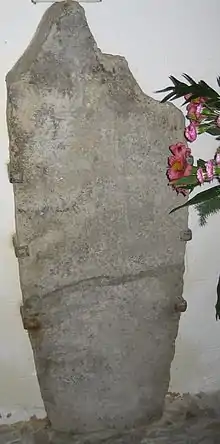
Tombstone of Æthelwulf of Wessex, buried in 858 at Steyning
| Year | Date | Event | Reference |
|---|---|---|---|
| c.827 | Sussex annexed by Kingdom of Wessex | [26] | |
| 828 | Historia Brittonum is written, which refers to the "Night of the Long Knives" in which Sussex is ceded by sub-Roman authorities to Saxons. | ||
| 839 | Æthelstan becomes "King of the Dwellers in Kent, of the East Saxons, of the South Saxons and of Surrey" on the authority of his father, Æthelwulf of Wessex. | [27] | |
| 858 | Æthelwulf of Wessex buried at Steyning. | [28] | |
| 860 | Æthelberht of Wessex becomes king of Wessex. Sussex, together with Essex, Kent and Surrey, is fully subsumed as part of this kingdom. | [29][30] | |
| 885 | King Alfred meets his biographer, Asser, for the first time at Alfred's royal estate at Dean in Sussex. | [31] |
10th century
| Year | Date | Event | Reference |
|---|---|---|---|
| After 915 | The Burghal Hidage lists five burhs (fortified towns or forts) in Sussex at Chichester, Burpham, Lewes, Hastings and Eorpeburnan | ||
| 927 | Æthelstan styles himself as King of the English, becoming the first king to do so. | ||
| 930 | 3 April | England-wide Royal Council (Witenagemot) takes place at Lyminster, included King Æthelstan and his councillors. | [33][34] |
| 994 | Vikings commanded by Olaf Tryggvason and Sweyn Forkbeard raid the coast of Sussex. | [35] |
11th century
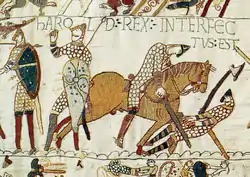
Scene from the Bayeux Tapestry depicting the death of King Harold at the Battle of Hastings
| Year | Date | Event | Reference |
|---|---|---|---|
| 1011 | The last Viking raid on Sussex takes place at Hastings. Later in the same year, Sussex is ruled by the Danes | [36] | |
| 1049 | Sweyn Godwinson abducts his cousin Beorn at Bosham and later murders him. | [37] | |
| 1064 | Harold Godwinson sets sail for Normandy from Bosham. | [38] | |
| 1066 | September | William of Normandy lands at Pevensey. | [39] |
| 1066 | 14 October | Battle of Hastings at Senlac Hill. | [40] |
| 1075 | The Council of London decrees that the bishopric for Sussex should be moved from Selsey Abbey to a new cathedral at Chichester. | [41] | |
| 1088 | Rebellion of 1088: William II captures the rebel leader Odo of Bayeux in a six-week siege at Pevensey Castle. | [42] | |
| 1090 | First mention of Church in the wood Hollington, Saint Leonards on Sea |
12th century
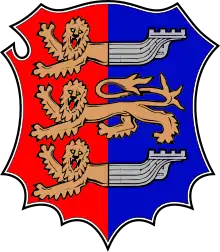
The coat of arms of Hastings, shows a motif that features widely in the heraldry of the Cinque Ports
| Year | Date | Event | Reference |
|---|---|---|---|
| 1108 | Chichester Cathedral is consecrated under Bishop Ralph de Luffa. | [41] | |
| 1139 | Siege of Arundel - part of the events of the Anarchy. | [43] | |
| 1155 | Earliest known charter of the Cinque Ports, included Hastings and later Rye, Winchelsea and Seaford. | [44] | |
| 1187 | Fire destroys Chichester Cathedral and much of the city of Chichester. | [45][46][47] | |
| 1194 | While Richard the Lionheart is held captive in France, King John's forces lay siege to Chichester Castle. | [48] | |
| 1199 | Chichester Cathedral is re-consecrated under Bishop Seffrid II. | [46][47] |
13th century

A medieval wall painting of St Richard of Chichester
| Year | Date | Event | Reference |
|---|---|---|---|
| 1208 | King John confiscates Bramber Castle from the de Braose family, after suspecting them of treachery. | [48] | |
| 1215 | 22 January | While King John visits Knepp Castle for 4 days, confederated barons assemble in London to determine how best to check the career of this vicious king. | [49] |
| 1216 | in part of the First Barons' War, Rye and Winchelsea open their gates to Prince Louis of France in an unsuccessful bid to take the crown from the hated King John | [50] | |
| 1216 | Chichester Castle is attacked and occupied by Prince Louis of France. | [48] | |
| 1217 | A force of Wealdsmen led by William of Cassingham ambushes Prince Louis of France and his men at Lewes, pursuing them to Winchelsea. | [51] | |
| 1225 | Chichester Castle is demolished so that it cannot be used again by French forces | [50] | |
| 1250-1262 | The Rape of Chichester is created, the last of Sussex's six sub-divisions, known as Rapes. | [52] | |
| 1262 | Pope Urban IV canonises St Richard of Chichester, former bishop of Chichester and now Sussex's patron saint. | [53] | |
| 1264 | 14 May | Battle of Lewes | |
| 1287 | February | Old Winchelsea completely destroyed by flood. | [54] |
14th century
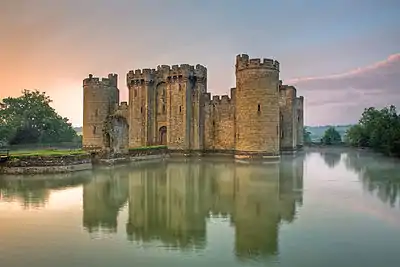
Bodiam Castle was constructed in 1385
| Year | Date | Event | Reference |
|---|---|---|---|
| 1315 | The Great Famine of 1315–17 brings a relatively large increase in mortality in Sussex and across much of northern Europe. | [55] | |
| 1336 | Edward III decides to site the county court for Sussex at Chichester. | [56] | |
| 1338 | Start of the English Channel naval campaign, part of the Hundred Years' War, saw the unwalled Hastings burnt to the ground. | [57] | |
| 1348 | Over the next 20 years the Black Death kills perhaps half of the population of Sussex. | [58] | |
| 1350 | 29 August | Battle of Winchelsea | [59] |
| 1353 | Chichester is named as the staple port for Sussex in the Statute of the Staple. | [56] | |
| 1377 | 10 December | Bishop William Reade receives permission to fortify Amberley Castle. | [60] |
| 1381 | Peasants' Revolt: people from Sussex participate in riots in London; Lewes Castle is sacked; | [61][62][63] | |
| 1385 | Work begins on Bodiam Castle | [64] |
15th century
| Year | Date | Event | Reference |
|---|---|---|---|
| 1406 | James I of Scotland is imprisoned in Pevensey Castle, where Henry IV of England provided for his education. | [65] | |
| 1419 | Joan of Navarre, dowager Queen of England, is imprisoned in Pevensey Castle for the next three years after her step-son Henry V accuses her of planning to destroy the king by sorcery | [66] | |
| 1450 | June | Rebels involved in Jack Cade's Rebellion assemble outside London. | [67] |
| 1450 | 12 July | Jack Cade fatally wounded at [[Cade Street | [67][68] |
| 1451 | Easter week | John and William Merfold indicted after publicly inciting the killing of the nobility, clergy, the deposition of King Henry VI and advocating rule by common people. | [67] |
16th century
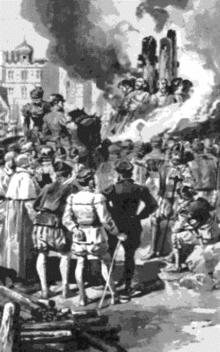
Depiction of martyrdom of Richard Woodman and nine others who were burned in Lewes
| Year | Date | Event | Reference |
|---|---|---|---|
| 1504 | A statute is passed to alternate the court of the High Sheriff of Sussex between Chichester and Lewes. | [69] | |
| 1538 | 20 December | Shrine of St Richard destroyed following a royal order from Henry VIII. | [70] |
| 1545 | 20 July | After the Battle of the Solent, the French Navy landed at Brighton and Newhaven but is repulsed. | [71] |
| 1555-1557 | As part of the Marian Persecutions, a significant number of men are martyred for their Protestant faith, including 17 men burnt alive in Lewes. | [72] | |
| c.1562 | First Huguenot community arrived at Rye, arriving at Winchelsea the following year. | [73] | |
| 1588 | 1 October | Ralph Crockett and Edward James executed in Chichester for being Catholic priests. | [74][75] |
17th century
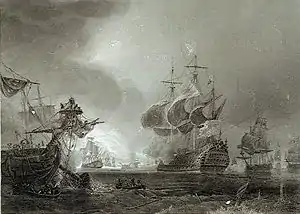
Steel engraving of scene from Battle of Beachy Head
| Year | Date | Event | Reference |
|---|---|---|---|
| 1611 | 24 March | The first known reference to cricket being played by adults is recorded at Sidlesham on the Manhood peninsula. | [76][77][78] |
| 1611 | First recorded use of the emblem of Sussex in John Speed's Theatrum Imperii Maganae Britanniae | [79] | |
| 1624 | 10 September | Jasper Vinall becomes the first person recorded to have died as a result of an incident in a game of cricket | [80] |
| 1642 | December | English Civil War: Battle of Haywards Heath results in the deaths or fleeing of 200 Royalists | [81] |
| 1642 | 22–27 December | English Civil War: Siege of Chichester | [82] |
| 1643 | 14 April - 1 May | English Civil War: Siege of Arundel Castle | [83] |
| 1655 | George Fox preaches at Ifield and as a result the first weekly Quaker meeting in Sussex is held; the first Quaker Friends meeting house in Sussex is built in 1676. | [84] | |
| 1690 | 10 July | Battle of Beachy Head. | [85] |
18th century
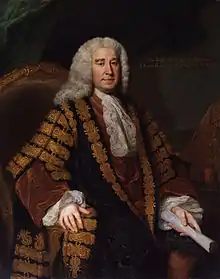
Henry Pelham, who became the British Prime Minister in 1743
| Year | Date | Event | Reference |
|---|---|---|---|
| 1743 | 27 August | Henry Pelham, one of the two MPs elected to the county of Sussex constituency, becomes Prime Minister of Great Britain. | [86] |
| 1745 | Sussex Weekly Advertiser first published. | [87] | |
| 1749 | At a special Assize in Chichester, seven men were convicted of smuggling and their part in murders carried out by the Hawkhurst Gang. | [88] | |
| 1768 | 19 February | Thomas Paine moves to Lewes, where he develops his political ideas, particularly as part of the Headstrong Club. | [89] |
| 1794 | Sussex Yeomanry founded when there was a threat of invasion in the Napoleonic Wars. | [90] |
19th century
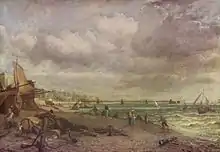
Brighton's Chain Pier, Sussex's earliest pier, was built in 1823. Painting by John Constable c.1824
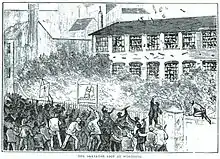
The Skeleton Army rioting in Worthing in 1884
| Year | Date | Event | Reference |
|---|---|---|---|
| 1801 | 27 November | Prince Augustus Frederick becomes Duke of Sussex | [91] |
| 1804 | 3 June | Birth of Richard Cobden, statesman and co-founder of the Anti-Corn Law League | [92][93] |
| 1804 | Charles Lennox, 4th Duke of Richmond, gets royal permission for the title 'Sussex' to be transferred from the 25th Regiment of Foot to the 35th (Royal Sussex) Regiment of Foot. This regiment was replaced by the Royal Sussex Regiment 180 years later in 1881. | [94] | |
| 1813 | Ashburnham blast furnace is closed, the last in the Weald as iron production is produced more cheaply in the Midlands and the north of England using coke. | [95] | |
| 1822 | Gideon Mantell discovers dinosaur teeth in Tilgate Forest that he later names as a new genus of dinosaur found 'iguanadon', the second named genus of dinosaur. | ||
| 1823 | Sussex's first pier, the Chain Pier, is built in Brighton. | [96] | |
| 1828 | 11 June | Sussex County Hospital (now Royal Sussex County Hospital) opens in Brighton | |
| 1830 | Captain Swing riots take place across Sussex and England. | [98] | |
| 1832 | The Petworth Emigration Scheme is set up by the Earl of Egremont. Over the next five years around 1,800 working-class people from Sussex and neighbouring counties emigrate to Upper Canada to escape poverty. | [99] | |
| 1835 | John Sparshott is hanged in Horsham, becoming the second to last person in England to be put to death for homosexuality | [100] | |
| 1836 | 27 December | Lewes avalanche kills 8 people. | [101] |
| 1837 | 27 March | Death of Maria Fitzherbert, longtime companion of the future King George IV of the United Kingdom at her home in Steine House, Brighton. | [102] |
| 1839 | 1 March | Sussex County Cricket Club formed, the first county cricket club. | [103] |
| 1840 | 11 May | The first railway line in Sussex, from Brighton to Shoreham opens. | [104] |
| 1853 | Lewes Prison, the local prison for male prisoners in Sussex, is opened. | [105] | |
| 1861 | 25 August | Clayton Tunnel rail crash results in 23 deaths. | |
| 1865 | The County of Sussex Act 1865 confirms the sub-division of Sussex into east and west areas for purposes of administration. | [106] | |
| 1884 | Skeleton Army riots in Worthing | [107] | |
| 1889 | County Councils were established for Sussex's eastern and western divisions. | ||
| 1893 | An outbreak of typhoid fever in Worthing results in 188 fatalities. | [108] | |
| 1894 | Administration of the south of Tunbridge Wells and south of Lamberhurst is transferred to Kent County Council | [109][110] | |
| 1896 | The National Trust acquires its first property, Alfriston Clergy House in Alfriston. | [111] |
20th century
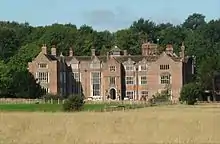
Danny House in Hurstpierpoint, where the terms of the armistice to be offered to Germany were agreed in 1918
| Year | Date | Event | Reference |
|---|---|---|---|
| 1907 | "Sussex by the Sea", written by William Ward-Higgs from his South Bersted home, is published for the first time. | [112] | |
| 1910 | An airfield is established at Shoreham Airport making it one of the world's first airports. | [113] | |
| 1916 | 30 June | Battle of the Boar's Head, known as "the Day Sussex Died" | [114] |
| 1918 | 13 October | At a meeting at Danny House in Hurstpierpoint, the Imperial War Cabinet agrees terms of the armistice to be offered to Germany at the end of World War I. | [115] |
| 1925 | The Administration of Estates Act 1925 abolishes the custom of 'borough English' or ultimogentiture, a practice that prevailed more extensively in Sussex than elsewhere in England. | ||
| 1926 | 11 May | Angry confrontations known as Battle of Lewes Road take place in Brighton during the 1926 United Kingdom general strike. | |
| 1934 | 9 October | Fascists and anti-Fascists clash at the Battle of South Street in Worthing. | [116] |
| 1940 | September | Operation Sea Lion planned by Nazi Germany to land on the Sussex coast and part of the coast of Kent and invade the United Kingdom. | [117] |
| 1940 | German air raids on Sussex begin, those in Brighton being known as the Brighton Blitz. | ||
| 1942 | Dieppe Raid launched from Newhaven. | [118] | |
| 1943 | Deception plan Operation Fortitude launched to convince Nazis that invasion would come from First United States Army Group based in Sussex and Kent to invade the Pas-de-Calais department of northern France. | [119] | |
| 1944 | Ports of Shoreham and Newhaven used as embarkation points for the D-Day landings. | [120][121] | |
| 1945 | 8 May | VE Day marks the end of the war in Europe. | [122] |
| 1945 | 15 August | VJ Day marks the end of World War II. | [123] |
| 1946 | New Towns Act 1946 designates Crawley as the site of a new town. | [124] | |
| 1961 | August | Charter granted to the University of Sussex, the first university in Sussex. | [125] |
| 1962 | Chichester Festival Theatre opens. | [126] | |
| 1965 | 14 June | Bishop David Cashman is made the first bishop of the Roman Catholic diocese of Arundel and Brighton. | [127] |
| 1966 | Sussex Downs Area of Outstanding Natural Beauty was designated; it was revoked in 2010 upon the establishment of the South Downs National Park. | ||
| 1967 | The first Brighton Festival and Brighton Fringe are held | ||
| 1967 | The first South of England Show is held at Ardingly. | [128] | |
| 1968 | Sussex Police is formed. | [129] | |
| 1971 | Chichester Harbour Area of Outstanding Natural Beauty is set up by an Act of Parliament. | ||
| 1972 | July | The South Downs Way is established as Sussex's first National Trail and the UK's first long-distance bridleway. | [130] |
| 1972 | October | Sussex Gay Liberation Front holds a demonstration in favour of gay rights, a precursor to the annual Brighton Pride event | [131] |
| 1974 | As part of the Local Government Act 1972 the Lord Lieutenancy of Sussex replaced with one each for East and West Sussex which are made ceremonial counties. | [132] | |
| 1980 | Wilton Park is used as a venue for South African leaders including Jacob Zuma and the ruling National Party to meet behind closed doors. | [133] | |
| 1982 | At a meeting of the International Whaling Commission in Brighton, delegates vote for a moratorium on commercial whaling. | [134] | |
| 1983 | 22 October | BBC Radio Brighton is relaunched as BBC Radio Sussex. | [135] |
| 1983 | 28 October | High Weald Area of Outstanding Natural Beauty is confirmed. | [136] |
| 1984 | 12 October | Brighton bombing assassination attempt on Prime Minister Margaret Thatcher | [137] |
21st century

The South Downs was designated a national park on 1 April 2010
| Year | Date | Event | Reference |
|---|---|---|---|
| 2000 | Brighton and Hove is granted city status, becoming Sussex's second city | ||
| 2002 | 7 October | Piers Sellers becomes the first native of Sussex to journey into outer space. | [138] |
| 2003 | Thousands of Chagossians settle in Crawley following their earlier forced eviction by the UK Government from Diego Garcia in the Indian Ocean | [139] | |
| 2007 | 16 June | Sussex Day, Sussex's county day is celebrated for the first time. | [140] |
| 2009 | 14 March | Finance ministers and central bankers of the G20 meet at South Lodge Hotel in Lower Beeding in advance of the 2009 G20 London summit. | |
| 2011 | 1 April | South Downs National Park becomes fully operational. | [141] |
| 2011 | 20 May | Flag of Sussex registered by Flag Institute. | [142] |
| 2012 | 21 November | Katy Bourne is elected as the first Sussex Police and Crime Commissioner | [143] |
| 2013 | Summer | Protests against fracking take place in Balcombe | [144] |
| 2013 | 21 November | Beachy Head West, Kingmere and Pagham Harbour are made the first Marine Conservation Zones in Sussex waters. | [145] |
| 2014 | UNESCO designates land between the Rivers Adur and Ouse to be the Brighton and Lewes Downs Biosphere Reserve, Sussex's first UNESCO Biosphere Reserve. | [146] | |
| 2015 | 22 August | A Hawker Hunter T7 military aircraft participating in the Shoreham Airshow crashes onto the A27 dual carriageway outside of Shoreham Airport, killing 11 people and injuring 16 others. | [147] |
| 2015 | 15 December | Timothy Peake becomes the first British European Space Agency astronaut as well as the first person from Sussex to board the International Space Station. | |
| 2016 | May | The South Downs National Park is granted International Dark Sky Reserve status, to restrict artificial light pollution above the park; it is the second such area in England and the 11th in the world. | [148] |
| 2016 | 23 June | The people of Sussex vote to leave the EU by a margin of 50.23% to 49.77% or 4,413 votes in the referendum on UK membership of the EU. | [149][150] |
| 2018 | The Rampion Wind Farm becomes operational, a wind farm that lies off the Sussex coast between Worthing and Seaford. | [151] | |
| 2018 | 3 October | Prince Harry and Meghan Markle make their first official visit to Sussex as Duke and Duchess of Sussex | [152] |
| 2020 | 6 February | The first case in Sussex of COVID-19 was reported when a man who returned from Singapore and France to the Brighton on 28 January | [153][154][155] |
See also
References
- Wacher 2020, p. 255
- Wacher 2020, p. 255
- Cannon 2009, p. 541
- Wacher 2020, p. 255
- "The Geography of Ptolemy". Roman Britain Organisation. Archived from the original on 23 April 2015. Retrieved 14 May 2015.
- Olusoga 2016, p. 33
- "Anderitum". Pastscape, Historic England. Retrieved 14 May 2015.
- Grehan & Mace 2012, p. 8
- Sally White. The Patching hoard published in Medieval Archaeology. pp. 88-93
- ASC Parker MS. 477AD."Her cuom Ęlle on Bretenlond 7 his .iii. suna, Cymen 7 Wlencing 7 Cissa, mid .iii. scipum on þa stowe þe is nemned Cymenesora, 7 þær ofslogon monige Wealas 7 sume on fleame bedrifon on þone wudu þe is genemned Andredesleage."
- Grehan & Mace 2012, p. 9
- ASC Parker MS. 485AD.
- ASC Parker MS. 491AD.
- Grehan & Mace 2012, p. 10
- ASC Parker MS. AD607.
- Keys, Jim (2010). The Dark Ages. Lulu.com. p. 97. ISBN 9781445229850.
- Creighton 2014, p. 25
- Bede.HE.IV.13
- Bede.HE.IV.15
- Kirby 2000, p. 114
- "Beyond the Tribal Hidage" (PDF) (PDF). University College London. Retrieved 14 May 2015.
- Fitzpatrick-Matthews, Keith. "Ravenna Cosmography -Group 6a: southern Hampshire/western Sussex". Retrieved 14 May 2015.
- Cannon, Cannon & Hargreaves 2009, p. 24
- Brandon 2006, p. 71
- Grehan & Mace 2012, p. 11
- Edwards, Heather (2004). "Ecgberht [Egbert] (d. 839), king of the West Saxons in the Oxford Dictionary of National Biography". Oxford University Press. Retrieved 22 June 2014.
- Points 2013, p. 29
- "Early Medieval – AD 410-1066" (PDF) (PDF). Chichester Harbour Conservancy. Retrieved 4 July 2014.
- Higham & Ryan 2013, p. 245
- Kirby 2000, p. 169
- Lapidge et al. 2013
- Lowerson 1980, p. 43
- Roach 2013, pp. 60–61
- Keynes 2013, p. 36
- Mason & Brink Shoemaker 2004, p. 20
- Logan 2013, p. 159
- Armstrong 1971, p. 44
- Armstrong 1971, p. 45
- Jones 2010, p. 18
- Jones 2010, p. 19
- "Chichester Cathedral - its history and its art". Chichester Cathedral. Retrieved 10 May 2015.
- "1088 Rebellion Against William II". www.sussexcastles.com. Retrieved 3 April 2015.
- Daniell 2013, p. 38
- Stanton 2015, p. 233
- Bartlett 1841, p. 258
- Naylor 2013
- Melton 2014, p. 782
- Grehan & Mace 2012, p. 38
- Symonds, Richard. "Knepp Castle Timeline" (PDF) (PDF). Knepp Castle Estate. Retrieved 3 May 2015.
- Grehan & Mace 2012, p. 69
- Hernon 2013
- "Victoria County History - The rape of Chichester". British History Online. Retrieved 9 February 2012.
- Seward 1996
- Campbell 1992, p. 193
- Jordan 1997, p. 118
- "Constituencies - Chichester". The History of Parliament. Retrieved 14 April 2015.
- Longmate 2011
- Broadberry, Stephen; Campbell, Bruce M.S.; van Leeuwen, Bas (27 May 2010). "English Medieval Population: Reconciling Time Series and Cross Sectional Evidence" (PDF) (PDF). University of Warwick. p. 9. Retrieved 25 April 2015.
- Wagner 2006, p. 310
- Elwes & Robinson 1876, p. vi
- "Sussex EUS – Lewes" (PDF) (PDF). Lewes District Council. Retrieved 21 April 2015.
- "1381 The Peasants Revolt". Sussex Castles. Retrieved 21 April 2015.
- Cooper 2006, p. 80
- "Bodiam Castle". National Trust. Retrieved 16 April 2015.
- Potter 2012, pp. 116–117
- Fritze & Robison 2002, pp. 288–289
- "Jack Cade's Rebellion/The Merfold Rebellion". Socialism or Your Money Back. Retrieved 16 April 2015.
- Spence 1999, p. 233
- Herrup 1989, p. 23
- Lehmberg 2014, p. 71
- "Battle of the Solent, 18th July 1545 - 19th July 1545". Threedecks.org. Retrieved 16 April 2015.
- "Remember remember...The Lewes 17". BBC. Retrieved 16 April 2015.
- Proceedings of the Huguenot Society of Great Britain and Ireland, Volume 28, Issue 5)
- Venn 2011, p. 420
- Challoner 1839, p. 143
- Taneja 2009, p. 71
- Shephard 2014, p. 328
- McCann 2004, p. xxxi
- "Sussex Flag". British County Flags. Retrieved 12 April 2015.
- McCann 2004, pp. xxxiii–xxxiv
- Manton 2013
- "The City of Chichester: Historical introduction". British History Online. 1935. Retrieved 1 April 2015.
- "Civil War Breaks Out at Arundel Castle" (PDF) (PDF). Arundel Castle. Retrieved 1 April 2015.
- "Ifield: Protestant nonconformity". British History Online: Victoria County History - Sussex A History of the County of Sussex: Volume 6 Part 3, Bramber Rape (North-Eastern Part) Including Crawley New Town... Ifield: Protestant nonconformity. Retrieved 30 March 2015.
- "Battle of Beachy Head 1690". Pastscape, Historic England. Retrieved 30 March 2015.
- "Past Prime Ministers - Henry Pelham". Gov.uk. Retrieved 21 March 2015.
- "David Arnold - 'Wilkes and Liberty' cried the crowds". Sussex Express. 2 November 2014. Retrieved 16 February 2015.
- Harper 2014, p. 30
- Begler 2007, p. 67
- Murland & Murland 2008, p. 60
- Knowles, Rachel (6 April 2013). "Prince Augustus, Duke of Sussex (1773-1843)". Regency History. Retrieved 21 March 2015.
- "Manuscripts and Special Collections - Richard Cobden (1804-1865; manufacturer and politician)". University of Nottingham. Retrieved 21 March 2015.
- Bloy, Dr Marjorie. "Biography = Richard Cobden (1804-1865)". Retrieved 21 March 2015.
- "35th (Royal Sussex) Regiment of Foot". National Army Museum. Archived from the original on 18 May 2015. Retrieved 21 March 2015.
- Hodgkinson, Jeremy. "Iron - a Once Great Wealden Industry" (PDF) (PDF). Woodland Trust. Retrieved 21 March 2015.
- Drewry 1832, pp. 69–74
- "History of Royal Sussex County Hospital Programme Board Presentation" (PDF). Brighton and Sussex University Hospitals NHS Trust. Retrieved 19 March 2015.
- Fraser & Brown 2014, pp. 220
- Messamore 2004, pp. 91–100
- Knight, Jeremy (6 July 2017). "'Unnatural' act of being gay saw teen lad hanged". West Sussex County Times. Retrieved 9 October 2018.
- Locke 2011, p. 146
- Knowles, Rachel (16 October 2011). "Mrs Fitzherbert (1756-1837)". Regency History. Retrieved 18 March 2015.
- Scott 2011
- Christopher 2014
- D'Enno 2007, p. 157
- Leslie & Short 1999, p. 126
- Bennett 2003, p. 185
- Bristow 2003, p. 152
- Brabant 1909, p. 312
- "Broadwater Down - Relationships and Changes". A Vision of Britain. Retrieved 29 August 2015.
- Quinn 2007, p. 139
- "Sussex By The Sea Lyrics". Sussex History. Retrieved 18 March 2015.
- Nick Bloom, "Sunny Shoreham", Pilot, February 2012, p70
- "Richebourg - The Day Sussex Died". The Royal Sussex Living History Group. Archived from the original on 5 April 2012. Retrieved 21 February 2015.
- "Danny House - History". Danny House. Retrieved 17 March 2015.
- Hare 1991, p. 178
- "Operation Sealion". History Learning Site. Retrieved 17 March 2015.
- Locke 2011, p. 154
- Barbier 2007, p. 132
- "Shoreham Port Remembers D-Day". Shoreham Port. Retrieved 21 February 2015.
- Symonds 2014, p. 221
- "1945: Rejoicing at end of war in Europe". BBC. Retrieved 21 February 2015.
- "1945: Allied nations celebrate VJ Day". BBC. Retrieved 21 February 2015.
- "Select Committee on Transport, Local Government and the Regions: Appendices to the Minutes of Evidence. Supplementary memorandum by Crawley Borough Council (NT 15(a))". United Kingdom Parliament Publications and Records website. The Information Policy Division, Office of Public Sector Information. 2002. Retrieved 2 April 2008.
- "About the University". University of Sussex. Retrieved 21 February 2015.
- "Chichester Festival Theatre - About Us". Chichester Festival Theatre. Retrieved 9 October 2018.
- "Bishop David John Cashman". Catholic Hierarchy. Retrieved 21 February 2015.
- "Ardingly" (PDF) (PDF). Mid Sussex District Council. Archived from the original (PDF) on 29 August 2013. Retrieved 21 February 2015.
- "Sussex Police Authority". National Archives. Retrieved 21 February 2015.
- Ravenscroft 1992, p. 145
- www.sitebysimon.co.uk, Simon Chilton -. "Brighton Ourstory :: A History of Lesbian & Gay Brighton Chapter 3: Out of the Closet, 1967-87". www.brightonourstory.co.uk. Retrieved 14 February 2018.
- UK Government. Local Government Act 1972. Retrieved 27 January 2014.
- "History of Wilton Park". Wilton Park. Retrieved 21 February 2015.
- McCarthy, Michael (2 January 2006). "20 years on and whales are under threat again". The Independent. Retrieved 1 October 2018.
- "Radio Legends: Piers Bishop". BBC. Retrieved 21 February 2015.
- "Facts and figures". High Weald AONB. Retrieved 21 February 2015.
- Tebbit, Norman (12 October 2014). "Brighton bombing: I can't find it in my heart to forgive the creature Magee, says Norman Tebbit". The Telegraph. Retrieved 21 February 2015.
- "Sussex astronaut Dr Piers Sellers looks back on the Space Shuttle". The Argus. 25 June 2011. Retrieved 20 February 2015.
- Demetriadi, Alexi (22 June 2017). "Lost in exile: The forgotten Chagos Islanders". New Internationalist. Retrieved 8 October 2018.
- "Sussex Day". West Sussex County Council. Retrieved 31 August 2012.
- "'Historic day' for South Downs National Park". BBC. 1 April 2011. Retrieved 20 February 2015.
- "Teenager unveils Sussex County flag". English County Flags. 6 June 2011. Retrieved 20 February 2015.
- "Improved Turnout at this Year's Sussex PCC Election". Bexhill Observer. 6 May 2016. Retrieved 9 May 2016.
- Stanley Reed (7 August 2013). "Goals Collide in Drilling Protests". The New York Times. Retrieved 8 August 2013.
- "Marine conservation zone designations in England". GOV.UK. Retrieved 19 February 2016.
- "Brighton & Lewes Downs". UNESCO. Retrieved 6 October 2018.
- "Shoreham Airshow crash: Pilot in critical condition". TV News Room. TV News Room. Archived from the original on 23 August 2015. Retrieved 23 August 2015.
- "South Downs National Park wins 'dark sky reserve' status". BBC. 10 May 2016. Retrieved 16 September 2019.
- "RESULT: Sussex votes to leave by majority of just 4,400 votes". West Sussex County Times. 24 June 2017. Retrieved 24 January 2018.
- "EU referendum: Sussex votes narrowly for Brexit". BBC. 24 June 2017. Retrieved 24 January 2018.
- "Rampion Offshore Wind Farm Hits Full Stride". Offshore Wind.biz. Retrieved 6 October 2018.
- "Harry and Meghan visit Sussex as duke and duchess". BBC. 3 October 2018. Retrieved 6 October 2018.
- Spiteri, Gianfranco; Fielding, James; Diercke, Michaela; Campese, Christine; Enouf, Vincent; Gaymard, Alexandre; Bella, Antonino; Sognamiglio, Paola; Sierra Moros, Maria José; Riutort, Antonio Nicolau; Demina, Yulia V. (5 March 2020). "First cases of coronavirus disease 2019 (COVID-19) in the WHO European Region, 24 January to 21 February 2020". Eurosurveillance. 25 (9). doi:10.2807/1560-7917.ES.2020.25.9.2000178. ISSN 1025-496X. PMC 7068164. PMID 32156327.
- Boseley, Sarah; Campbell, Denis; Murphy, Simon (6 February 2020). "First British national to contract coronavirus had been in Singapore". The Guardian. Archived from the original on 7 February 2020. Retrieved 26 February 2020.
- Mohdin, Kim Willsher Aamna; Madrid, and Sam Jones in (8 February 2020). "Coronavirus: British nine-year-old in hospital in France". The Observer. ISSN 0029-7712. Archived from the original on 26 February 2020. Retrieved 27 February 2020.
Bibliography
- Armstrong, J.R. (1971). A History of Sussex. Sussex: Phillimore. ISBN 0-85033-185-4.
- Barbier, Mary (2007). D-day Deception: Operation Fortitude and the Normandy Invasion. Greenwood Publishing Group. ISBN 978-0275994792.
- Bartlett, Esquire Thomas (1841). The New Tablet of Memory; Or, Chronicle of Remarkable Events; with the Dates of Inventions and Discoveries in the Arts and Sciences; and Biographical Notices, Etc. Thomas Kelly.
- Begler, Elsie (2007). Thomas Paine: Common Sense for the Modern Era. Lulu.com. ISBN 978-1879691872.
- Bennett, David Malcolm (2003). The General: William Booth, Volume 2. Xulon Press. ISBN 978-1594672064.
- Brabant, Frederick Gaspard (1909). Rambles in Sussex. Sussex: Methuen.
- Brandon, Peter (2006). Sussex. London: Phillimore. ISBN 978-0-7090-6998-0.
- Bristow, Joseph, ed. (2003). Wilde Writings: Contextual Conditions. Toronto: University of Toronto Press. ISBN 978-0802035325.
- Campbell, Bruce M. S. (1992). Before the Black Death: Studies in the "crisis" of the Early Fourteenth Century. Manchester University Press. ISBN 9780719039270.
- Cannon, John (2009). A Dictionary of British History. Oxford: Oxford University Press. ISBN 978-0199550371.
- Cannon, John; Cannon, John Ashton; Hargreaves, Anne (2009). The Kings & Queens of Britain. Oxford: Oxford University Press. ISBN 978-0199559220.
- Challoner, Richard (1839). Memoirs of Missionary Priests: And Other Catholics of Both Sexes, that Have Suffered Death in England on Religious Accounts, from the Year 1577 to 1684, Volumes 1-2. John T. Green.
- Christopher, John, ed. (2014). Locomotives of London, Brighton and South Coast Railway. Amberley Publishing Limited. ISBN 978-1445634517.
- Cooper, Charles (2006). A Village in Sussex: The History of Kingston-Near-Lewes. I.B.Tauris. ISBN 978-1845111908.
- Creighton, Charles (2014). A History of Epidemics in Britain, Volume 1. Cambridge University Press. ISBN 978-1107621930.
- Daniell, Christopher (2013). From Norman Conquest to Magna Carta: England 1066–1215. Routledge. ISBN 978-1136356971.
- D'Enno, Douglas (2007). Brighton Crime and Vice, 1800-2000. London: Longman, Rees, Orme, Brown, Green & Longman.
- Drewry, Charles Stewart (1832). A Memoir of Suspension Bridges: Comprising The History Of Their Origin And Progress. Casemate Publishers. ISBN 978-1845630300.
- Elwes, Dudley George Cary; Robinson, Charles John (1876). A History of the Castles, Mansions, and Manors of Western Sussex. Longmans & Company.
- Fraser, Hamish; Brown, Callum G. (2014). Britain Since 1707. Routledge. ISBN 978-1317867500.
- Fritze, Ronald H.; Robison, William B. (2002). Historical Dictionary of Late Medieval England, 1272-1485. Greenwood Publishing Group. ISBN 9780313291241.
- Grehan, John; Mace, Martin (2012). HBattleground Sussex: A Military History of Sussex from the Iron Age to the Present Day. Casemate Publishers. ISBN 978-1848846616.
- Hare, Chris (1991). Historic Worthing: The Untold Story. Cassell Reference. ISBN 9780900075919.
- Harper, Charles G. (2014). The Smugglers: Picturesque Chapters in the Story of an Ancient Craft. Indo-European Publishing.
- Hernon, Ian (2013). Fortress Britain: All the Invasions and Incursions Since 1066. The History Press. ISBN 978-0752497174.
- Herrup, Cynthia B. (1989). The Common Peace: Participation and the Criminal Law in Seventeenth-Century England. Cambridge University Press. ISBN 978-0521375870.
- Higham, Nicholas; Ryan, M.J. (2013). The Anglo Saxon World. Yale University Press. ISBN 978-0300125344.
- Jones, Kaye (2010). 1066 In An Hour. History In An Hour. ISBN 978-1452392318.
- Jordan, William Chester (1997). The Great Famine: Northern Europe in the Early Fourteenth Century. Princeton University Press. ISBN 978-1400822133.
- Kirby, D.P. (2000). The Earliest English Kings. Routledge. ISBN 9780415242110.
- Lapidge, Michael; Blair, John; Keynes, Simon; Scragg, Donald (2013). The Wiley Blackwell Encyclopedia of Anglo-Saxon England. Chichester: John Wiley & Sons. ISBN 978-1118316108.
- Lehmberg, Stanford E. (2014). The Reformation of Cathedrals: Cathedrals in English Society. Princeton University Press. ISBN 978-1400859801.
- Leslie, Kim; Short, Brian (1999). An Historical Atlas of Sussex. Phillimore. ISBN 978-1860771125.
- Locke, Tim (2011). Bradt Slow Sussex & South Downs National Park: Local, Characterful Guides to Britain's Special Places. Bradt Travel Guides. ISBN 978-1841623436.
- Logan, F. Donald (2013). The Vikings in History. Routledge. ISBN 978-1136527098.
- Longmate, Norman (2011). Defending The Island: From Caesar to the Armada. Random House. ISBN 978-1446475751.
- Lowerson, John (1980). A Short History of Sussex. Folkestone: Dawson Publishing. ISBN 0-7129-0948-6.
- Manton, Colin (2013). Haywards Heath Through Time. Amberley: Amberley Publishing Limited. ISBN 978-1445628677.
- Mason, Emma; Brink Shoemaker, Robert (2004). The House of Godwine: The History of a Dynasty. A & C Black. ISBN 978-1852853891.
- McCann, Tim (2004). Sussex Cricket in the Eighteenth Century. Sussex Record Society.
- Melton, J. Gordon (2014). Faiths Across Time: 5,000 Years of Religious History. ABC-CLIO. ISBN 978-1610690263.
- Messamore, Barbara Jane (2004). Canadian Migration Patterns from Britain and North America. University of Ottawa Press. ISBN 978-0776605432.
- Murland, Jenny; Murland, Jerry (2008). Departed Warriors: The Story of a Family in War. Troubador Publishing Ltd. ISBN 978-1906510701.
- Naylor, Murray (2013). England's Cathedrals by Train: Discover how the Normans and Victorians Helped to Shape our Lives. Remember When. ISBN 978-1473826960.
- Olusoga, David (2016). Black and British: A Forgotten History. Pan Macmillan. ISBN 9781447299745.
- Points, Guy (2013). The Combined Anglo-Saxon Chronicles. Guy Points. ISBN 978-0955767968.
- Potter, Philip J. (2012). Monarchs of the Renaissance: The Lives and Reigns of 42 European Kings and Queens. McFarland. ISBN 978-0786491032.
- Quinn, Tom (2007). Britain's Best Walks. New Holland Publishers. ISBN 978-1845377847.
- Roach, Levi (2013). Kingship and Consent in Anglo-Saxon England, 871-978: Assemblies and the State in the Early Middle Ages. Cambridge University Press. ISBN 978-1107036536.
- Scott, Les (2011). Bats, Balls & Bails: The Essential Cricket Book. Random House. ISBN 978-1446423165.
- Seward, Desmond (1996). Sussex. Pomegranate Press. ISBN 978-0712651332.
- Spence, Keith (1999). The Companion Guide to Kent and Sussex. Boydell & Brewer Ltd. ISBN 978-1900639262.
- Stanton, Charles D. (2015). Medieval Maritime Warfare. Pen and Sword. ISBN 978-1781592519.
- Symonds, Craig L. (2014). Neptune: The Allied Invasion of Europe and the D-Day Landings. Oxford University Press. ISBN 978-0199986125.
- Venn, John (2011). Alumni Cantabrigienses: A Biographical List of All Known Students, Graduates and Holders of Office at the University of Cambridge, from the Earliest Times to 1900. Cambridge University Press. ISBN 978-1108036078.
- Wacher, John, ed. (2020). Towns of Roman Britain. Routledge. ISBN 9781000117318.
- Wagner, John A. (2006). Encyclopedia of the Hundred Years War. Greenwood Publishing Group. ISBN 978-0313327360.
This article is issued from Wikipedia. The text is licensed under Creative Commons - Attribution - Sharealike. Additional terms may apply for the media files.